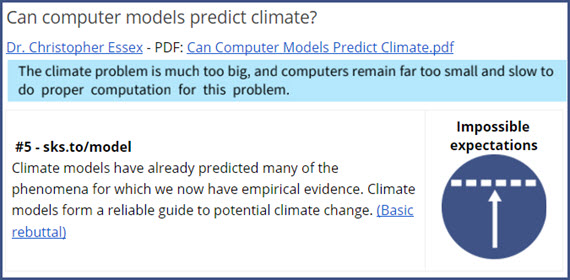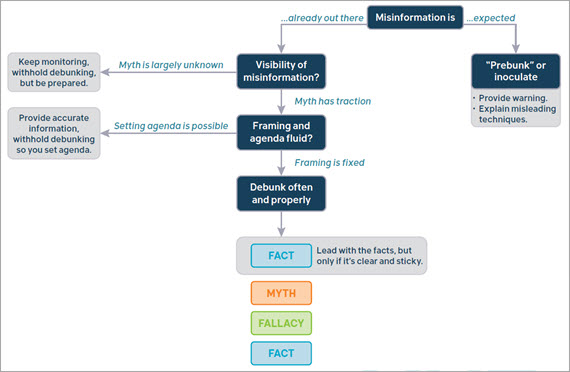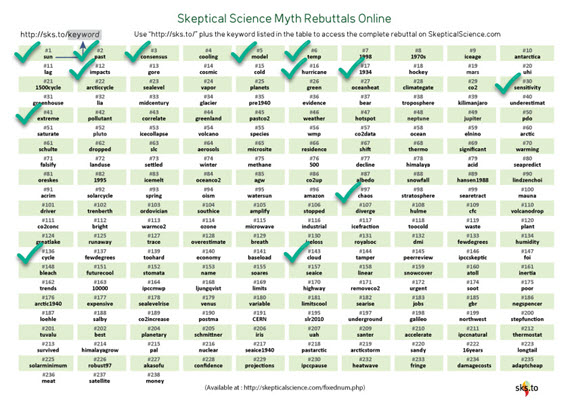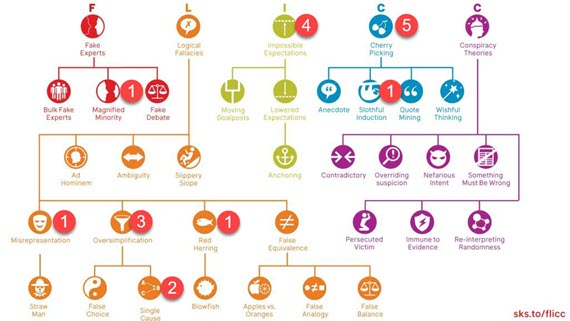Case study - identifying myths and fallacies in Climate Science (Mis)Information Briefs
Posted on 28 January 2021 by BaerbelW
This short blog post and the linked PDF document is the result of a collaborative effort by Anne-Marie Blackburn, Dana Nuccitelli, Bärbel Winkler, Ken Rice and John Cook.
When the climate change (mis)information briefs pushed by David Legates and others started to make the rounds in January 2021 we wondered whether or not they would be worth spending any time to debunk. This is sometimes a bit of a toss-up as, on the one hand, you have to debunk misinformation often and properly, while on the other you don’t want to give it undue publicity while doing so. This is illustrated by this chart from the recently published Debunking Handbook 2020 outlining the strategic landscape for debunking:
Figure 1: The strategic landscape of debunking (The Debunking Handbook 2020)
Eventually the urge of some of our team members to debunk these briefs won out and Anne-Marie Blackburn, Dana Nuccitelli, Bärbel Winkler, Ken Rice, and John Cook collaborated to put together a document for easy reference to point people to as and when needed. Instead of providing detailed explanations of all that is wrong in the flyers, we decided to quickly identify the most obvious examples of long-debunked myths. These are shown in the document as screenshots (Figure 2) from the flyers followed by a link to the relevant rebuttal and a short explanation of why the assertion is wrong:

Figure 2: Example debunking showing a screenshot from the climate briefs
In addition to simply mentioning the myth, we also identified the logical fallacies underpinning these errors as a way of illustrating the recurring flaws in arguments that claim to discredit the science of climate change. You can read the complete document here.
Once we were done with this exercise we had identified at least 13 long-debunked myths in the flyers, some of which made an appearance more than once. As a picture says more than a thousand words, here is the myth rebuttal chart with the most obvious myths checked (Figure 3):
Figure 3: Myth Rebuttal Chart (click for larger version)
As mentioned above, we also applied FLICC to the arguments made and identified several of the typical characteristics of science denial. Not too surprisingly, cherry picking was most often used (5 times) followed closely by impossible expectations (4 times) and oversimplification (3 times). Here is the corresponding graphic (Figure 4):
Figure 4: FLICC Chart (click for larger version)
To learn more about the overall taxonomy check out A history of FLICC: the 5 techniques of science denial.
Bottom line: this task required more time and effort than the flyers deserve, but on the other hand, the way we did it may serve as a recipe to go about future such activities, which we all wish wouldn’t occur but also know will happen again sooner rather than later.































 Arguments
Arguments

































Thanks for the effort that the team puts into this.
It is so sad that the misinformation campaigns use such old, tired myths over and over and over and over again.
It is so sad that they manage to fool so many people with them.
The reason these misinformation campaigns that use logical fallacies manage to fool so many people might be as simple as logic not being taught in school. It wasn't taught when I went to school in the 1970s and 1980s, but by pure chance I stumbled across a book on logic and fallacies when quite young. However there is probably more to it. Many people just dont think terribly logically.
Some people use logical fallacies as a matter of course, because to them its all about winning the argument by fair means or foul. It becomes ingrained in them.
nigelj @ 2
I really hope that John Cook's Cranky Uncle game can help with this general and widespread issue! Have you seen the Teachers' Guide he published yesterday?
https://crankyuncle.com/teachers-guide-to-cranky-uncle/
"Winning the argument" also has a lot in common with "making the sale".
There is an entire industry out there whose sole purpose is to convince people that they need something they previously didn't know they needed. And probably things they don't actually need.
The psychological tricks used in the marketing business are being applied in the political arena, and in general by anyone wanting to shape public opinion. For sales, there are "Truth in advertising" regulations and possibilities of criminal prosecution (at least in Canada, where I live), but that doesn't apply to so much of our social discourse.
A "well-informed public" is our best protection, but too much is done to make sure the public is not well-informed.
The mantra of this dishonesty is "you can fool all of the people some of the time, and you can fool some of the people all of the time, and that's enough."
BaerbelW @3, yes I have read it thanks. I have posted a link to it in a response to someone over on the Realclimate website.
Bob Loblaw @4,
When I got my MBA decades ago the professor of the Marketing course prefaced the course by telling us how the science of marketing could be abused to fool people, but that we were to avoid trying to benefit from the tactic because it would only temporarily be successful.
Tragically, misleading marketing only being able to temporarily succeed has been all that is needed by Political Parties inclined to cheat that way, success on election day (or the short period of election days).
More tragically, there continues to be a lack of effective measures to discourage or penalize misleading political marketing.
Social Democracy (pursuing truer democracy through the correction of developed injustice and inequity) and the international pursuit of constantly improved understanding of how to reduce harm and be more helpful to Others, especially to help future generations are important parts of the solution. Those guiding principles are the basis of Agenda 21 and the Sustainable Development Goals which focus on limiting the harm done by fossil fuel use because limiting the harm of climate change makes it easier to achieve almost every other SDG objective.